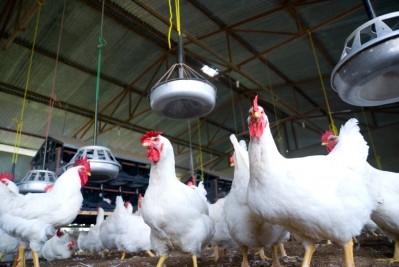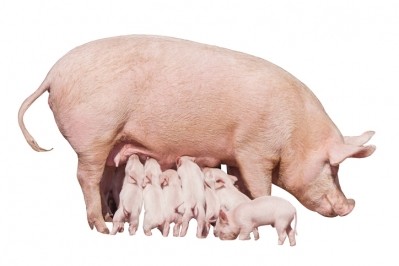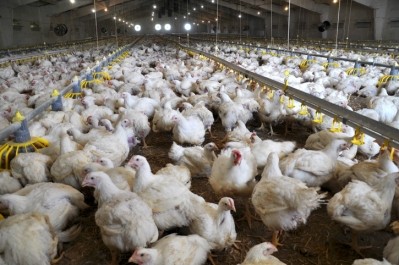ADM looks to boost farmed animals' ability to withstand stress

Animal nutrition has an important role to play in positively influencing animal resilience and much research is underway to unlock the potential of functional ingredients, says ADM.
Resilience describes an animal’s ability to respond to and reduce the impact of stressors. A variety of external pressures have elevated the need for more resilient farm animals, including consumer focus on how animals are raised, the environmental impacts of animal production, less reliance on antibiotics and a business’s profit margins, according to a new report from the US company.
And a lack of resilience can mean higher production losses and added costs for veterinary services, health treatments and labor costs, noted ADM.
The gut microbiome is emerging as a central component to overall health and well-being, with the microbiota ensuring nutrient absorption while also defending against pathogens, said the company, with it outlining how increased exposure to bacteria and viruses can heighten the risk of disease and negatively impact an animal’s health and growth performance.
ADM scientists and others are exploring the physiological and metabolic changes that accompany an animal’s exposure to stressors to learn more about the mechanisms the animal uses for necessary functions. The company said this approach can also help find new ways to support efficiencies by using nutrition to accelerate recovery and minimize the impact of negative stressors on performance.
We caught up with Pierre-Joseph Paoli, president, feed additives and ingredients, ADM Animal Nutrition, to hear more about the company's work in terms of helping farmed animals withstand various stressors, as well as its work on novel ingredients, its efforts in relation to environmental sustainability, and upcoming product launches.
FeedNavigator: First off, have the number of stressors that farmed animals are to exposed increased over the past few years?
Pierre-Joseph Paoli: It’s not so much that the level of stressors has increased – though this year heat stress is certainly a factor – it’s more that our approach has shifted to prevention rather than treatment. That’s where the focus on animal resilience is coming from. Animal nutrition can positively influence animal resilience, which is the body’s ability to respond to and reduce the impact of stressors. We recognize that animals that are healthier throughout their lives have improved performance, and it potentially affects environmental impacts as well.
It’s been shown that quality nutrition can help accelerate animal recovery by supporting physiological functions. For example, in animals experiencing heat stress, our formulations have shown improved average daily feed intake and increased average daily gain in swine, greater feed efficiency in dairy cows and broilers, and higher milk yields in cows.
FEN: Where does ADM carry out its research and development work in relation to evaluating which physiological and metabolic changes accompany an animal’s exposure to stressors?
PJP: ADM has a global network of R&D facilities and scientists, including Decatur, Illinois, US; France; Brazil and Vietnam. Advanced technology and our knowledge of the microbiome has opened new opportunities. Our researchers are diligently working to understand the mode of action behind our products. Our solutions are optimized by data and evidence. We won’t put a ‘black box’ out in the market; we are transparent with our customers about how a solution works.
FEN: The animal nutrition industry is putting greater emphasis on the role of the gut microbiota. What is ADM's focus in relation to that space?
PJP: With scientific advancements and greater accessibility to the gene sequencing process, interest in the gut microbiome has increased exponentially. ADM is active in this space, particularly through recent acquisitions such as Biopolis, Deerland and Protexin. Today we have a library of strains across the board, from prebiotics to probiotics to postbiotics, and across species – both human and animal.
FEN: ADM would seem to be focusing more on early animal nutrition, particularly sow related nutrition.
PJP: We understand that growing healthy animals requires the best conditions at early life stages – that nutrition in early life can affect future growth processes and performance. Our animal nutrition strategy emphasizes providing the right nutrients at the right time.
This is another area where our CitriStim (Pichia guilliermondii) yeast product can make a difference in animal resilience. Numerous studies indicate improved reproductive performance among sows and gilts supplemented with CitriStim during gestation and lactation. Additionally, evidence suggests that piglets born to these supplemented sows have greater resilience after birth and even after weaning.
FEN: What impact are the various animal diseases from ASF to PRRSV to AI to coccidiosis and necrotic enteritis having today, and how is ADM addressing those in terms of mitigation per species?
PJP: As the industry shifts away from antimicrobials as a preventative solution and antibiotic growth promoters, functional nutrition is increasingly important to help maintain profitable animal production.
A variety of nutrition solutions have demonstrated potential to modulate immune responses in both human and in vitro trials. There’s also heightened emphasis on biosecurity to help mitigate disease outbreaks before they become a regional – or global – concern.
FEN: What opportunities is the company exploring in relation to protein innovation?
PJP: Some of the materials ADM is best known for, such as lysine or amino acids, also have exciting implications. Our whole yeast product, Pichia guilliermondii, has unlocked a variety of applications, whether that’s the citric acid within our CitriStim and AquaTrax products for livestock and aquaculture, respectively, or the amino acids that serve as an alternative protein. We also see applications within the health and wellness space for farm animals as well as pets. As a specific example, we’ve learned that we can reduce dietary crude protein by improving the digestible amino acid supply in broiler feed. Researchers found improvements in breast weights and yields compared to the control, and they saw a reduction in nitrogen excretion without performance losses.
FEN: What is ADM’s focus now in terms of aqua feed, where lie future opportunities for the company in this segment, and can you outline if there will be aqua feed product launches in the not-too-distant future?
PJP: Aquaculture is a dynamic area of ADM’s animal nutrition business, particularly in the Latin American and Asia Pacific regions. Our current focus is on warm-water species, specifically tilapia and shrimp, but we also supply raw materials for other areas of aquaculture production. We provide a range of feed solutions from hatchery to nursery stage to grow-out.
We are working towards new product launches, possibly for the end of 2022 or early 2023. As much as we may want to quickly bring new products to market, we abide by rigorous quality standards to do right by our customers.
FEN: Are there launches expected also in products targeted at other species, and, if so, when?
PJP: We have many projects in the works, such as organic trace minerals that will have a cross-species impact. We are also exploring a range of biotics applications and solutions for the reduction of methane emissions while optimizing animal performance.
FEN: Freight and feed costs have been undermining the profitability of many animal producers – how has ADM being able to ride out this storm and how it is helping farmers in respect of costs?
PJP: ADM has a unique place in the value chain, with influence both upstream and downstream.
With our global scope we can reduce the effects of supply chain challenges to our customers. For example, we can speak to our commodities colleagues about raw materials to make new connections that will benefit producers.
FEN: What is ADM doing to address environmental sustainability demands in terms of optimization of animal performance but also through the collation of LCA data to support transparency on carbon reduction goals?
PJP: Precise nutrition is a strategy to formulate feed customized to each species’ specific nutritional requirements. Improving bioavailability and digestibility means fewer environmental emissions and a higher feed conversion ratio.
We are also engaged in a life cycle analysis of our feed additives and solutions so we can provide reliable, peer-reviewed data to producers. We want to honor the trust are customers are giving us. It’s very important to ADM that our data is verified by third parties, such as the Global Feed LCA Institute (GFLI).
FEN: The North American market was traditionally ADM’s most developed region when it came to animal nutrition – is that still the case?
PJP: Yes, North America was historically the center of our animal nutrition efforts. With recent acquisitions and investments around the globe, we are a bit more balanced now across regional markets.








